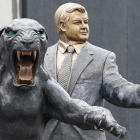CHARLOTTE, N.C. -- Just more than two years ago as he was closing on a $2.275 billion deal to buy the Carolina Panthers, hedge fund billionaire David Tepper decided he could live with the 4,500-pound statue of team founder Jerry Richardson at Bank of America Stadium's north entrance.
Richardson, the disgraced former owner of the team who put his life's work up for sale within hours of an explosive Sports Illustrated article detailing workplace misconduct, had essentially demanded that anyone he sold the team to would have to keep his statue up front in perpetuity.
Tepper held his nose and agreed to the deal. He had been a minority owner of the Pittsburgh Steelers and realized his hometown Steelers would never get out of the Rooney family for as long as he was alive. Only so many NFL teams come up for sale, and this was his chance.
Plus, Tepper made a gamble. He wanted to close on the deal as soon as possible because the U.S. Supreme Court had just ruled that states could individually legalize sports gambling. He figured if he waited any longer, the price of the franchise would go up as Richardson realized how sports gambling would eventually increase his asset's worth.
And so it was that as long as the Carolina Panthers were the Carolina Panthers, the 12-foot, 10-inch Jerry Richardson statue surrounded by two panthers with large ... male anatomy would stay. He couldn't throw a big shroud over it. Couldn't plant some oak trees around it. Couldn't build a taller statue next to it, even if he wanted to. All that was written into the deal.
The only way Tepper could ever move that statue was if it became a safety hazard. If some rotten vandals chipped away at the base of the sculpture and made its edges jagged, that'd be a problem at one of the three entrances to a 70,000-seat stadium, for example.
Or -- and this is a crazy thought, I know -- if protesters here in Charlotte directed aim at the statue. If centuries of oppression continue to boil and people decided they didn't want a memorial to a man who spouted racial slurs and bathed in misogyny.
Well, what do you know? On Wednesday, the Panthers said in a statement that they were "concerned there may be attempts" to take the statue down and that "moving the statue is in the interest of public safety."
Listen, if you think that statue is ever going back up, I have a bridge to sell you.
Tepper never wanted the statue. If you bought a house, would you want to keep the previous owner's wedding pictures on the mantle?
I can't say whether the threat of some intrepid citizens taking matters into their own hands was ever real. If you're the type that cares about monitoring the destruction of property that isn't yours, Charlotte has really only had one night of that since protests began weeks ago. This city hasn't been on fire. To my knowledge, no anonymous anti-fascist groups were plotting a statue takedown anytime this week. Still, Tepper can reasonably get away with this excuse at this moment in our nation's history.
To be sure, Jerry Richardson is not Derek Chauvin, the former Minneapolis police officer who is now charged with second-degree murder in the death of George Floyd. Richardson does not directly represent the power structures that have allowed and enabled police brutality against Black people.
What Richardson does represent -- and what he lived -- is a system of abusing his power. Of committing multiple acts of sexual harassment against female employees and using a racial slur directed at a Black scout, according to a Sports Illustrated report from 2017 that was never refuted by Richardson either publicly or in an NFL investigation.
According to the report, Richardson would ask female employees if he could shave their legs. Back rubs went too low and/or too long. He'd buckle able-bodied women into their seats with his "seatbelt maneuver" that would allow him to graze a woman's breasts with his hand.
One female employee, angered by the slow pace of the NFL's investigation, later wrote an open letter for Sports Illustrated that detailed further allegations like Richardson rubbing her legs and feet, asking her to turn around so he could see how she looked in jeans, putting his hands to her mouth for her to kiss them and, of course, the seatbelt maneuver. (Richardson declined to respond to those allegations, and a spokesman for Richardson told a Charlotte TV station Wednesday that Richardson "has worked to treat all people fairly in his business and personal lives.")
The process of removing and securing Richardson's statute took about 32 minutes. Five workers in reflective vests began by looping straps around Richardson's chest and arms before a crane hooked up to one of the loops. The workers then sawed and pried at Richardson's feet on the four-foot pedestal before Richardson began floating toward a flatbed.
He was lowered down easily, the crane lightly placing him on his right side before softly rolling him over flat on his back. A Black man in a pink shirt and hardhat guided the crane operator the whole time by signaling directions with one hand while steadying the statue at Richardson's left foot with his other hand.
This wasn't the sort of foot rub Richardson envisioned.
![[object Object] Logo](https://sportshub.cbsistatic.com/i/2020/04/22/e9ceb731-8b3f-4c60-98fe-090ab66a2997/screen-shot-2020-04-22-at-11-04-56-am.png)



















